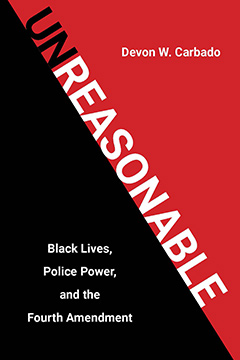What We’re Reading: Unreasonable — Black Lives, Police Power, and the Fourth Amendment
Unreasonable: Black Lives, Police Power, and the Fourth Amendment, Devon Carbado

As a teenager, I got pulled over by the police an excessive number of times—without ever receiving a ticket. Instead, there was a typical pattern: “What are you doing in this neighborhood? Can I see the car keys? Do you have any drugs?” When I got older, I realized these stops had two things in common: they often occurred when I was driving with Black friends and while in their predominantly Black neighborhoods.
I didn’t know it at the time, but this is what the over-policing of Black communities looks like, resulting in interactions that too frequently turn violent and deadly. Nationally, about 1,000 people are killed by police every year. Of these 1,000, the rate at which Black Americans are killed is more than twice as high as the rate for white Americans. This doesn’t consider non-fatal rates of police violence, which researchers, for example, have estimated could be 800 or more shot and injured annually by police nationwide.
While solutions to reduce police violence are being advocated for at all levels of government, Devon Carbado argues in his book—Unreasonable: Black Lives, Police Power, and the Fourth Amendment—that understanding the “structural” nature of police violence is necessary knowledge for progress. That is, racial disparities in policing are not just the result of individual “bad cops,” but police are in fact authorized to have frequent contact with Black people—interactions which have been made lawful and legitimate by an unlikely source: the Fourth Amendment.

Indeed, a string of Supreme Court cases rooted in Fourth Amendment law paved the way for the over-policing of Black neighborhoods. These cases expanded the power of police to conduct things like pedestrian checks and traffic stops, and not only disproportionately harms Black people, but Black women—of which Carbado bases the fictional character he uses to illustrate the application of Fourth Amendment precedent. It is these laws that provide officers the wide latitude to interact with Black communities, which often result in a range of violence.
Unreasonable is an empowering read. Carbado’s own experience of being racially profiled as a Black man led to years of work researching race and policing in America, culminating in a book that translates complex American legal jurisprudence into accessible policing scenarios that many readers will relate to. No legal expertise is needed—Carbado writes this book as if he were teaching his law students at UCLA, including helpful visuals along the way.
Unreasonable is the “know-your-rightslessness” manual I wish I could have read in high school. Like other readers, my book margins are filled with notes on how the Fourth Amendment has justified my own experiences with the police—all largely due to my own proximity to Blackness. The book helps reveal why “simply limiting the frequency with which police interact with Black people could save Black lives.” Although a small part of a larger problem and admittedly difficult to do, this work begins with better understanding why and how police violence occurs in the first place.
— Hoang Pham
Thank you to everyone who attended our Oct. 24 book talk with Devon Carbado, moderated by Stanford Law Professors Jennifer Chacón and David Sklansky. The event was co-sponsored by SCRJ, Stanford Criminal Justice Center, and the Center for Comparative Studies in Race and Ethnicity.
